Beyond Winning & Losing
Coaches play key mentoring role
By Kathy Andrews
Involvement in intercollegiate athletics is a significant part of the student experience for many at Trinity College, with more than 700 student-athletes participating on 30 varsity teams, supported by 70 coaches and staff. Bantam squads have reached the highest levels of athletic competition, with generations of student-athletes experiencing the thrill of vying for a national title.
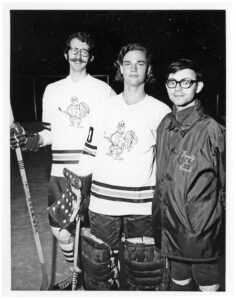
In March 2025, two Trinity teams were victorious in achieving such championships: women’s squash captured the College Squash Association’s (CSA) Women’s Team National Championship, the Howe Cup, for a second consecutive year, while men’s basketball won its first-ever National Collegiate Athletic Association (NCAA) Division III National Championship. These titles sparked the idea to contemplate the impact of Trinity coaches, who spend long hours guiding student-athletes, including in ways that extend beyond practices and competitions, offering life lessons that transcend athletics. We asked current student-athletes and alumni about the influence of their coaches and also checked in with the latest championship-winning teams’ head coaches.
TRUST, RESPECT, AND MORE
Instructor in Physical Education and Head Women’s Squash Coach Lauren Patrizio began her first Trinity season in summer 2024. Six months later, she and her team headed to the nationals in Philadelphia—a “full-circle moment” for Patrizio as she returned to her alma mater’s campus where she clinched a national championship 25 years ago as captain of the University of Pennsylvania squash team. On the trip down with Trinity’s team, Patrizio made a call to seek words of wisdom from her former UPenn coach, who told her, essentially, “You’ve got this.” Says Patrizio, “I feel lucky to have a mentor like her to support me and continue being a voice in my life.”
When it comes to principal themes Patrizio focuses on with her squash players, “Trust, respect, commitment, and communication are all critical,” she says. “We also talk a lot about being prepared with the right equipment, making sure you can control what you can control. We regularly do a check-in, asking, ‘What’s your thermometer, from zero to 100?’ ” Patrizio notes. “A player might say they’re not 100 percent but then surprise themselves with a great practice. It’s important to check in with themselves and listen to their bodies.”
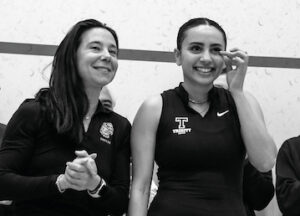
Women’s squash team member Kara Lincou ’26 says, “Coach Lauren did an incredible job keeping us calm and focused during the national championship, but what truly stood out was the compassion and trust she showed all season. She consistently supported us—whether we were dealing with injuries, mental health challenges, or nerves before a big match—always with empathy and generosity.”
Lincou, a psychology major from Réunion Island, a territory of France located in the Indian Ocean, adds, “Our team is made up almost entirely of international players, which means our coaches do far more than coach. They are our guides—our support system when urgent matters arise, when we’re worried about academics or even broader political contexts. In many ways, they’ve become our family away from home, and I believe that’s our greatest strength as a team.”
STANDARD OF EXCELLENCE
Entering his 16th Trinity season, James Cosgrove, associate professor of physical education and Marlynn V. and William P. Scully Head Men’s Basketball Coach, says that when recruiting players, he first looks for attitude, work ethic, and mental toughness. “Finally, we look for talent—it’s fourth on the list,” says Cosgrove. “I’d much rather have a team of guys with a great attitude and work ethic, who are mentally strong, even if they don’t have the most talent, as opposed to guys with a bad attitude, bad work ethic, who aren’t mentally strong and have all the talent in the world. I’d rather have that first team any day because they’ll beat the crud out of that second team nine times out of 10.”
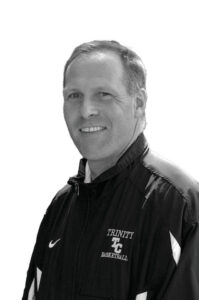
Men’s basketball team member Alex Douglas ’25 says he learned from Cosgrove that “how you do anything is how you do everything. Having a standard of excellence, almost a perfectionist attitude—that’s Coach Cos’s expectation,” says Douglas. “He wants us to strive for perfection in every aspect of how we contribute to the community, whether in the classroom, on the court, in everything we do.”
Douglas, who graduated in May with a B.S. in psychology, appreciates what he calls Cosgrove’s never-say-no attitude. “I think we could play an NBA team and he’d actually go into it trying to win the game. No matter the situation, no matter how much you’re down, having someone who’s an authority figure who believes in you and believes you’re going to win is very important.”
Reflecting on his team’s first NCAA Division III National Championship, Cosgrove is quick to credit former Trinity Head Coach Stan Ogrodnik, describing him as the “architect” of the men’s basketball program. “Stan was one of the reasons I came to Trinity, and he has remained a mentor to me. This championship is all of ours—former players, coaches, everybody who helped build this tradition,” says Cosgrove. “Student-athletes came here because of the strong reputation of Trinity basketball and Trinity academics. Without previous players and coaches, we don’t win this.”
LIFE LESSONS
Alumni who were inspired by Bantam coaches and now find themselves in the same profession include Renee Olsen Dowd ’15, head women’s lacrosse coach at Franklin & Marshall College. Dowd says she aims to share with her athletes what she learned from her lacrosse coaches at Trinity, Katy Dissinger Szymanski M’13, associate professor of physical education and head women’s lacrosse coach, and Kate Livesay M’07, now head women’s lacrosse coach at Middlebury College.
“They knew pushing through the hard moments made us better,” says Dowd, who majored in economics at Trinity. “That’s how I learned the value of hard work, perseverance, and teamwork. With some of the toughest workouts, my teammates and I would push each other, cheer for each other, and pick each other up when we needed it most. That stemmed from our coaches and the culture they were building.”
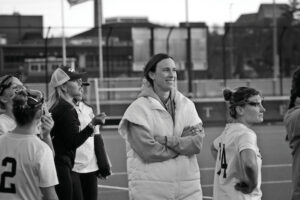
Dowd says Szymanski and Livesay made the team feel like a family. “It’s what made practice and bus rides and games so much fun. We had dinner at our coaches’ homes, and that connection is important on the field,” says Dowd. “When you’re battling for a ground ball in practice against your best friend, you know that competition is for the betterment of the team. When your coach is pushing you to run faster, holding you accountable, you know it’s because they see that potential in you. When you have that trust, that’s when teams succeed.”
Jeff Devanney ’93, professor of physical education and head football coach, points to lessons he learned as a Trinity athlete that he and his staff work on with players today, skills he sees Trinity football alumni exemplify in their postgraduation careers, too.
“I recently spoke to the Trinity Club of Hartford about sustaining success and how doing so as a college athlete correlates to success in business,” says Devanney. “First, you learn time-management skills. Juggling the demands of playing football at this level with the challenges of being successful in the classroom teaches you to become a good time manager.
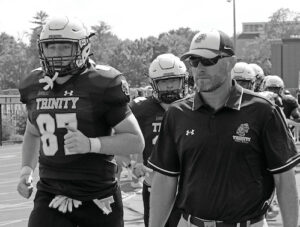
“Second, you develop a strong work ethic. I learned more about working hard by playing sports in college than anything else I had done to that point. Finding a work ethic is paramount to succeeding here and beyond.
“And a third example is grit,” says Devanney, who majored in history. “The real world after college is full of adversity. Those who can handle the adversity are those who have grit. Anyone who makes it through four years of college-level football must have grit.”
Matt Greason ’03, M’10, associate professor of physical education and head men’s ice hockey coach, also cites lasting takeaways from his time as a Bantam student-athlete. “I was fortunate enough to have two great coaches here, John Dunham for hockey and Bill Detrick for golf,” says Greason, a Trinity history major who earned an M.A. in American studies.
“From Coach Dunham, I learned the value of not letting your emotions dictate decisions or letting them overwhelm the situation. He was always very level-headed and deliberate; he saw the big picture through what is generally a very emotional game,” says Greason.
“Coach Detrick showed me the importance of passion in everything you do. I can still hear him saying, ‘You gotta have fire in your belly’ when we were getting ready to play golf,” says Greason. “I am lucky I found Trinity and that my coaching mentors shared lessons valuable in life, not just in coaching. I’m also fortunate I can take the passion I discovered as a student-athlete and pass it on to my Trinity hockey players.”
LASTING CONNECTION
“Being a student-athlete was one of the best parts of my experience at Trinity,” says Michael Lenihan ’07, who majored in public policy and law and was on the men’s swimming team. Founder and CEO of the community engagement nonprofit Public Sentiment, Lenihan says, “The refrain, ‘If you’re not early, you’re late,’ is one I admit I heard more often than I should have—always cutting it too close to team meetings—but it sank in. I’m never late to work meetings!
“Coach Kristen Noone was both a coach and mentor in and out of the water,” recalls Lenihan. “During summer breaks, she encouraged us to volunteer in an open-water fundraiser for cancer research, Swim Across America, keeping our team spirit alive and building meaningful and collaborative connections with our NESCAC competitors. The tight-knit friends I made on the swim team, the mental toughness built up through countless laps swum, and the sense of contributing to something bigger than myself are all things I carry proudly with me today.”
Likewise, Betsy Jones ’87, executive vice president at EBSCO Clinical Decisions, considers her time on the field hockey and lacrosse teams under Coach Robin Sheppard M’76, professor of physical education, emerita, and former associate director of athletics, still impactful.
“Being a student-athlete demands a high level of commitment—balancing academic responsibilities with athletic excellence,” says Jones, who majored in history at Trinity. “Coach Sheppard consistently fostered dependability, a deep team-first mentality, and a strong understanding of each player’s strengths and roles. Our shared commitment acted as an unspoken agreement, and our focus on both winning and learning from losses made us better,” says Jones.
“I believe I’ve been successful in business by carrying these same principles forward—leading and participating in teams built on trust, shared purpose, and accountability,” adds Jones. “In both sports and business, the foundation of great teams is the same: commitment, clarity, connection, and a relentless focus on outcomes. My experience at Trinity continues to shape how I lead and collaborate today.”
Do you have a story to share about your favorite Bantam coach? Please email your recollections to [email protected].
Header Image: Robin Sheppard M’76, professor of physical education, emerita, and former associate director of athletics, guiding student-athletes during a women’s basketball game. Photo Courtesy of the Trinity College Archive.
